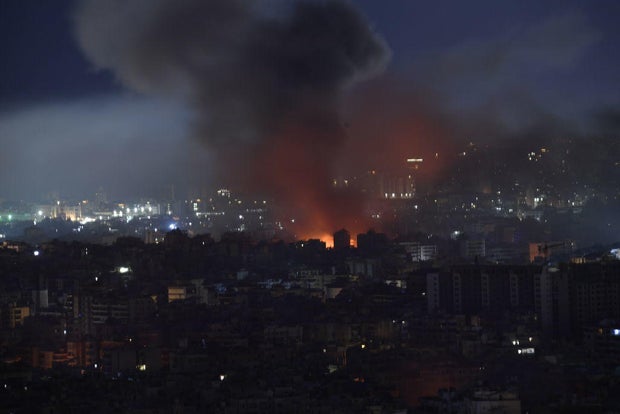At least 6 killed in Israeli airstrike in Beirut as foreign nationals evacuate

At least six people were killed and seven injured in an Israeli airstrike on an apartment building in Beirut overnight, Lebanon’s Health Ministry said Thursday, as governments around the world scrambled to evacuate their citizens from the country. The airstrike hit near the capital’s residential Bashoura district.
Residents reported a sulfur-like smell following the attack, and Lebanon’s state-run National News Agency accused Israel of using phosphorous bombs, which are prohibited by international law for use near civilian populations. Human rights groups have in the past accused Israel of using white phosphorus incendiary shells on towns and villages in conflict-hit southern Lebanon.
NOTE: This article includes images of wounded children that may disturb some readers.
CBS News’ Haley Ott reported that, shortly before the strike, Lebanese health officials said 46 people had been killed and 85 injured by Israeli strikes in the country over the last 24 hours.
Houssam Shbaro/Anadolu via Getty Images
Israel started launching ground incursions into southern Lebanon this week, ramping up its fight against the Iran-backed group Hezbollah while continuing its devastating war against Hamas in the Gaza Strip.
Israel’s air and ground operations in Gaza killed more than 50 people near the city of Khan Younis on Wednesday, including children, according to Palestinian health officials in the Hamas-run enclave.
The war in the densely packed Palestinian territory has killed more than 41,500 people since it was sparked almost a year ago by Hamas’ Oct. 7 terrorist attack.
Ramadan Abed/REUTERS
The fighting between Israeli forces and Hezbollah in Lebanon — a much larger, better armed group than Hamas — was described by the Israel Defense Forces on Wednesday as intense, as it confirmed eight soldiers had died in the operations.
The United Nations Security Council held an emergency meeting Wednesday to address the spiraling conflict in Middle East.
Iran’s ambassador to the U.N. said his country had launched nearly 200 missiles at Israel on Tuesday as a deterrent to further Israeli violence. His Israeli counterpart called the barrage an “unprecedented act of aggression.”
Israeli Prime Minister Benjamin Netanyahu vowed Tuesday to retaliate against Iran, while an Iranian commander threatened wider strikes on infrastructure if Israel did so.
President Biden said Wednesday that the U.S. and its other partners were in discussions with Netanyahu’s government about Israel’s pending response to the Iranian attack, which Mr. Biden has stressed should be “in proportion” to Iran’s missile salvo, which was largely thwarted by the U.S. ally’s advanced missile defense systems.
Mr. Biden said he would not support an Israeli attack on Iran’s nuclear facilities in response to the missile attack, but that the U.S. and its global allies supported Israel’s right to respond.
U.S. Secretary of State Antony Blinken said earlier this week that Iran’s attack was “totally unacceptable, and the entire world should condemn it,” but that “Israel, with the active support of the United States and other partners, effectively defeated this attack.”
Israel and Hezbollah have traded fire across the southern Lebanon border almost daily since the day after Hamas’ Oct. 7, 2023 attack, which saw terrorists kill 1,200 Israelis and take 251 more as hostages into Gaza, according to the Israeli government. The fighting has increased dramatically over the last two weeks, since Israel was accused of blowing up thousands of Hezbollah members’ communications devices and assassinating the group’s senior leader in a targeted strike in Beirut.
Japan on Thursday dispatched two Self Defense Force planes to prepare for a possible airlift of Japanese citizens from Lebanon. And the Australian Foreign Minister Penny Wong said on Thursday her government had booked 500 seats on commercial aircraft for Australian citizens, permanent residents and their families to leave Lebanon on Saturday.











